This is a sequel to the previous piece, In the Nairobi Slums: one week, all inclusive.
As with part 1, this is translation of a blog post by Tien Tran, all credits (photos and original French text) go to him. His website also features a lot of incredible photojournalism pieces.
Distress. Defeatism. Fatalism. So there really is nothing we can do? Not exactly.
During my stay, Eric **had told me about an organization he had created with **Heskey: the Mathare Foundation Youth Group. When I asked Heskey what was the most important thing to change here, his answer was swift: “We have to change the mentalities and get people out of their torpor”
This blew my mind. I was expecting him to answer: “a sanitation system”, “real buildings”, “running water”, “electricity”, or even “a brand new flat screen”. But no. His answer was crystal clear. We have to change the mentalities. Get people out of their torpor.
The kind of answer that makes you want to bang your head against the wall. That makes you cry out loud “How can I help?” Stuff? I have that. Money? I can save up some. Concrete? There you go. Hope? Err… How do you give hope to people? How do you get people out of their torpor? It’s hard. Mind-blowingly hard. Since the two of them realized they couldn’t change the present, Eric and Heskey decided to focus on another thing. This other thing, it’s the children. “We decided to offer them activities, football, theater, photography”.
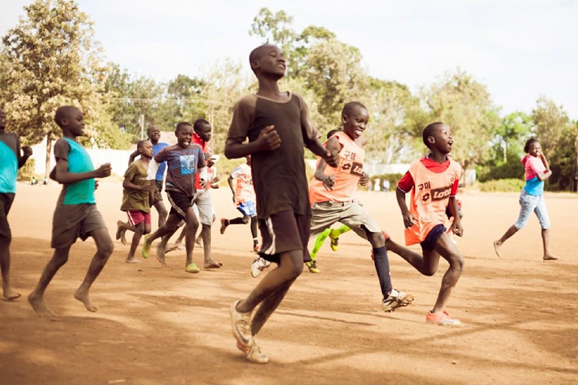
I have to admit that at the beginning, I had the feeling that these activities were kind of useless. Football? You have to teach them math, reading, hygiene, agriculture, to plant tomatoes, to filter water! Then I spent some days with them. And gosh, they’re kids, for Christ’s sake. They’re just a bunch of kids who live in a world too harsh for them and who learn very early to get by, by themselves. And football, this universally adored sport in Kenya, both by men and women, is their main way to have fun. Everyone plays football. Everyone thrills with the English clubs 7,000 kilometers from here, when then win, when they lose. Every kid here has a favorite club and a favorite player.
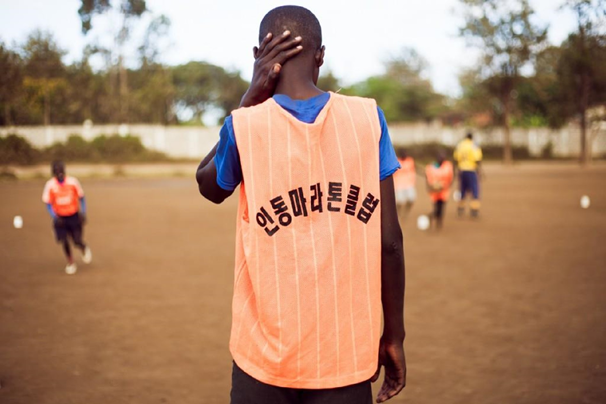
On the mornings of Saturdays and Sundays, as soon as 7 am, they are on the field. In this bubble where they immerse and stop caring about anything that’s not their game. Kicking the ball, score goals, tackle the opponent. Look at them running after this ball, now brown after being kicked and kicked again. Look at the smiles that light their faces when they score a goal. Kind of useless? After half an hour watching them run around, I quickly changed my mind. It’s one of the rare occasions they get to really have fun.
And of course, there are the slightly crazy dreams. Heskey hopes that one day, a professional football player makes it out of here. ”Do the European Clubs talent finders come to Mathare sometimes?”. He laughs and answers: “No, never!”
Football as a team sport, as one of the rare games they can play, get a thrill out of. To avoid future fatalism and defeatism? And maybe one day, they would have enough confidence to cross the road, get to the other side of Mathare.
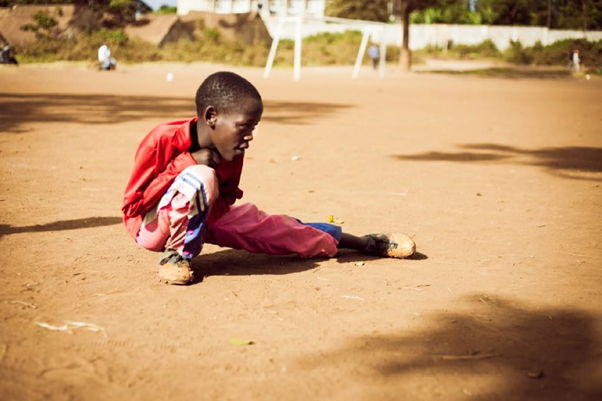
On my last Saturday with them, Eric told me that the foundation would be having theatrical activities. “Theater? How can theater help these kids?” I asked myself, as I was trying to avoid a hen that was giving me a rather aggressive look. “Theater enables us to deliver simple messages to the kids”, said Eric. In the middle of thirty kids piling up on the benches, a dozen of them started performing small plays in Swahili. Heskey was translating for me as they went along. The pitch of the first scene was pretty simple.
Exasperated by her alcoholic husband, a woman goes to see a witch doctor so that she can cure him from his addiction. Unfortunately, the spell doesn’t work. I didn’t quite understand the transition, but at the end, the husband dies, drowned by the community. Yeah, it’s quite brutal… The messages are generally simple, not to mention sometimes even simplistic, but here, there is no moral support hotline, no Crisis Services or rehab centers. No second chance, no redemption. If you flirt with addiction, it’s a one-way ticket to a miserable life and no one will help you. Not the government, not the community. Sometimes family. If they can afford it.
Other small plays followed, still played by the kids that dealt with prostitution or sexual relations between young people. In a country where condoms are considered a scam, AIDS wreaks havoc (according to the WHO, 16% of the sexually active adults in Kenya test positive for HIV).
The use of theater by this kind of organization isn’t new. SAFE Kenya, an NGO of which I had met the responsible of the regional branch in Mombasa, also uses theater as a way to spread awareness and information about the same kind of subjects (prevention against HIV, hygiene and sanitary rules, fight against discrimination, fight against female circumcision…).
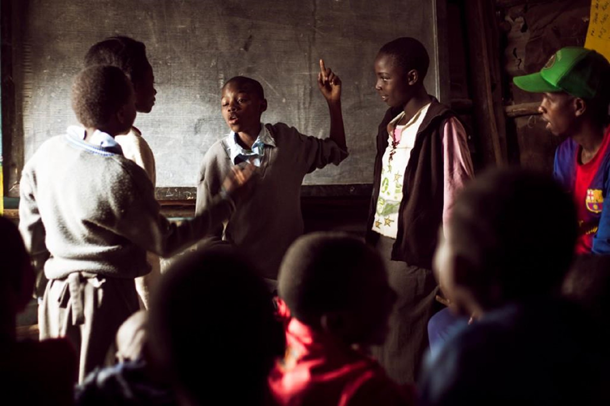 The alcoholic husband, superbly well played
The alcoholic husband, superbly well played
But I have to admit, what caught my eye the most, was the photography part. What would they teach these kids about photography? To document and tell about their lives? Composition techniques? Nothing of all this. What they fulfill, it’s the cornerstone, the essence of photography: hand out to the world a sense of what you see. What I saw there was pure Street Photography. The three old point-and-shoot cameras passed from hand to hand, in the midst of a group of kids through the whole slum.
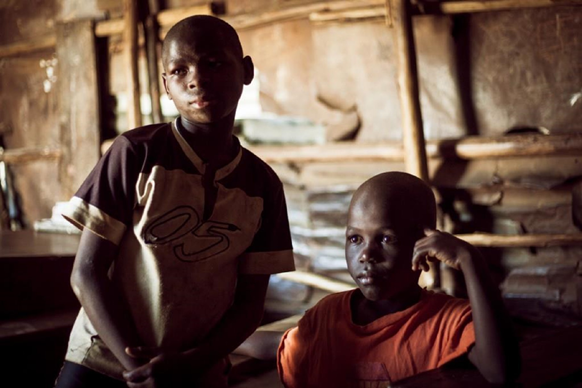
Everything they see, they shoot. Absolutely everything. The completely drunk guy staggering in front of them, the shacks, the dogs, that woman who’s cooking pig’s blood, their friend laughing. They meander in the streets, looking for subjects to shoot. Here is a selection of their work.
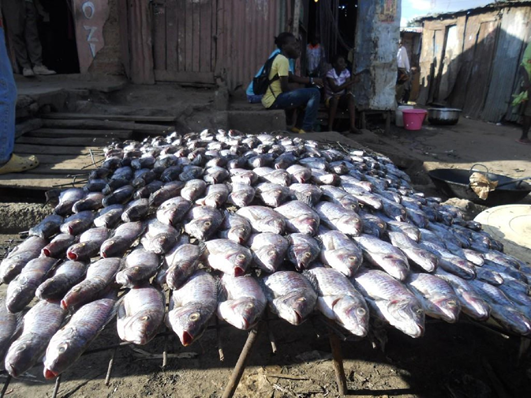 Pictures taken by the children (1/3)
Pictures taken by the children (1/3)
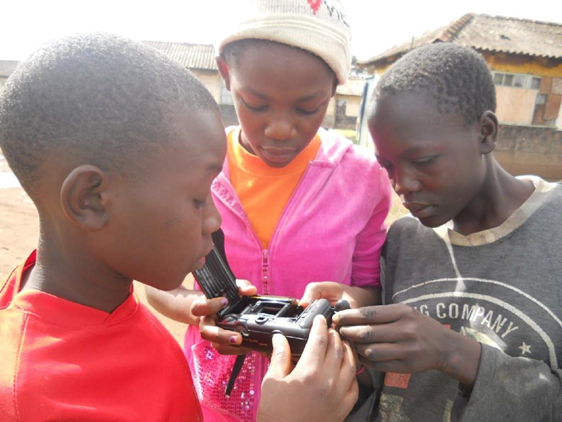 Pictures taken by the children (1/3)
Pictures taken by the children (1/3)
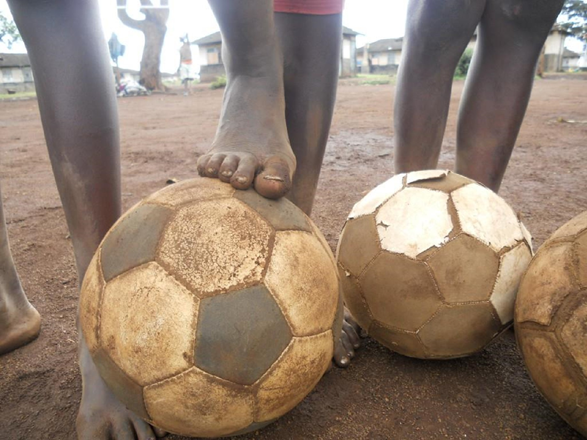 Pictures taken by the children (1/3)
Pictures taken by the children (1/3)
So, all in all, this is useful? Basically, you at least keep them out of the streets when they are not in school. “Don’t let your son hang around / if you don’t want him to slip and slide”, were singing NTM. Don’t let your kids hang around, if you don’t want them to end up in drugs, gangs, alcohol or prostitution. “And for the young girls, it may help thep avoid getting pregnant at 12. If you’re a girl, hanging around in the streets, you get married too soon and you throw your life away”, says Heskey. He keeps on: “In Mathare, adults are not there because they’re dead or working. These kids lack a figure to guide them and care for them”. I accompanied him and Eric when, during the week, they go from house to house, making sure that when the parents are not there, each and every kid is at home, with his siblings. They look after the community.
And those activities, they give ideas to the kids. Of course, half of them want to be professional football players. Others said they wanted to become photographers, writers or journalists.
But most importantly, for Eric, they help give those children a new horizon, another view of the world. “The issue”, he says, “is the mentality of the people who don’t want things to change, who are almost proud of living here, in this poverty. Some say that I think high of myself, wanting to make things change, wanting to help the young to get out of here, meeting and welcoming people from other countries. It’s jealousy”. This is bullshit. So, for these kids to follow another path, he decided to open their eyes to another world, different from Mathare.
The foundation takes part in football tournaments at the other side of the city. The kids go in buses to play football somewhere else. Just not here. To see something new. Nairobi, the capital, is a land of contrast. Huge glass towers sit in the city center, two or three kilometers from filth and poverty. “We try to give them possibilities, we try to make them understand that there is something else”, says Heskey. “So that when they are fifteen, they can have a choice, know that there are lives other than this one, and have the desire to fight to get it”. Eric sums it all up in one phrase: “We try to give them hope”
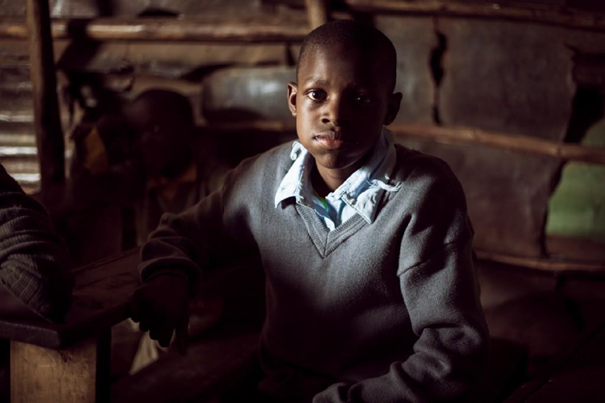
Eric works part time in a secondary school, coaching a girl’s football team. Heskey lives from temporary jobs, here and there. To finance the trips and the food, they often have to pay from their own pocket. Because there are no fees for members of the foundation. The annual budget for 2013 was 60,000 shillings, which accounts for 600 euros.
Suffice to say, resources are limited. Three footballs, two dozen football shirts, and empty painting jars to serve as field delimitation. Three point-and-shoot cameras and a few 512 Mb memory cards, all donated by friends of the foundation. Two panels for the photography exhibitions organized from time to time by the foundation. That’s it.
So yes, as you might expect, they are asking for help. From outside. Yet another time? One time too many? About that, I heard many speeches, and I am judging none of them, especially since I shared some of these views before this experience. No lectures from me. As has Eric told me, as long as you didn’t see it, you cannot know. Some say that we’d be better off putting our own houses in order before helping people at the other end of the word. Others maintain that giving money over there will be pointless because of the corruption and organized crime that soak all the donations. It is a reality.
We also have in France people living in extremely harsh conditions. I do not deny any of the challenges we face. There is another reality: institutionalized poverty. The mind-blowingly large number of people living in conditions worse than our pets. In Nairobi, 60% of the population lives in a slum. There are kids literally living in shit and who we let, because of the circumstances, grow up and only knowing about this life. There are people fighting from the inside for things to change.
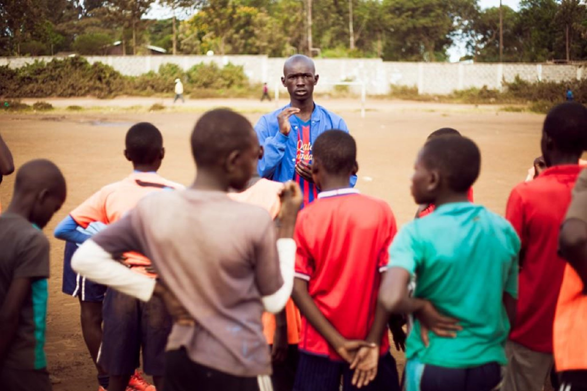 Eric gives advice during football practice
Eric gives advice during football practice
Why trust Eric? Why trust Heskey? Why trust a foundation you never heard of? How to trust? I asked myself that question hundreds of time. I still have no idea. I asked for all the administrative paperwork, all the invoices, all the bank statements. They gave me everything, scanned everything and I still have them with me. Before realizing that I was neither an accountant nor and administrative controller. But I ate, shitted and slept with Eric and Heskey, 24/7 for a week. I have seen these kids play football, take pictures, live, smile and laugh. The children? They have been my breath of fresh air in this desperate and hopeless environment. Sarah, the young German volunteer trusts them. That’s all I can give them but maybe that’s the most important.
Especially as they don’t need a lot, and not specifically money. Maybe a bit of gear. Football snickers (one out of two kids plays barefoot on a dirt field full of trash), team bibs, footballs, cameras. You know, those that we don’t use anymore because they are obsolete, not trendy anymore, too old, or just because the newer model is out. And money of course. They use it to pay the medical fees when the children get injured, the meals when travelling, the buses they need to play in tournaments and get out of the slums. Anything. They basically lack of everything. They make-do with what they can find to give those kids something to play with on the week end.
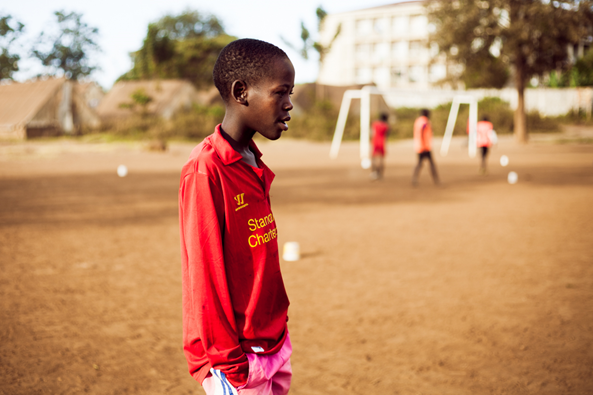
For the logistics, you’ll have to count on people traveling to Nairobi who would accept to dedicate one or two kilos in their suitcases to carry the donations they need, because the customs fees are too high for the modest financial means of the foundation. Eric told me he could find those “mules”.
And most importantly, what they have been insisting on during all my week there, is to tell you to come visit them. I won’t tell you that there weren’t moments where I was scared as hell when walking in the slums, especially after dark. I won’t tell you that you won’t feel very uneasy when going through all that poverty, especially if you’re not prepared for it. But nothing happened to me during my trip. And beyond the pictures and the words that you are reading, you will feel in your guts the incredible urgency and the enormity of the task waiting for these people for them to get out of a situation that shouldn’t exist in the 21st century. And there isn’t much you can do, except maybe go through your closets, get this old football and those old snickers you no longer use out and send an email to the foundation to organize the transfer.
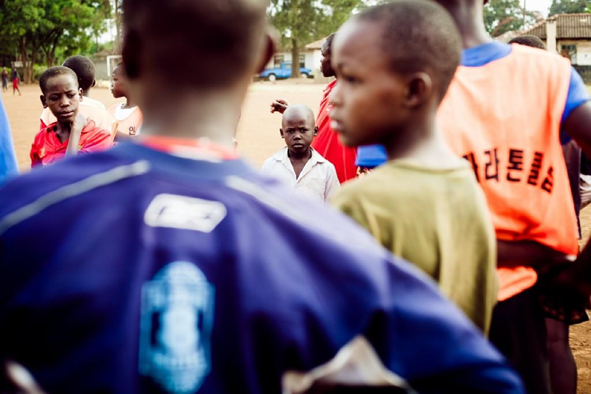
The truth is, a slum is a huge mess, with people doing everything they can for things to stay the same, residents whom the situation made desperate, and a few ants, droplets in an ocean, fighting for a bunch of kids to maybe have a chance to get out of there. There are forty children in this organization. Forty children playing football, taking pictures and performing plays, of the hundreds of thousands children living in the slums. It’s nothing and everything at the same time.
Sending an old camera, a football, an old pair of snickers or ten euros wouldn’t change the face of the earth. Mathare will always be here and millions of people will starve or die from illnesses. No school will be built, no well will be dug for a whole village, no big project, no giant vaccination campaign. Nothing of all that. Just a pair of shoes for a kid to kick in a ball on the week end. For him to have a barely more normal childhood, playing with his friends.
And you never know, maybe because of that, one day he will have the courage and the means to thing to himself: “I’m out of here”.
Text & Photos: Tien Tran Translation: Youssef Boulkaid
Addendum:
Since the time of writing, Mathare foundation has grown and had some incredible achievements and have been featured on CNN multiple times as well as on Africa24, an African news channel.
They have just started a crowdfunding campaign to build a youth center in the slums.
For more information you can also check out their website and follow them on their facebook page.